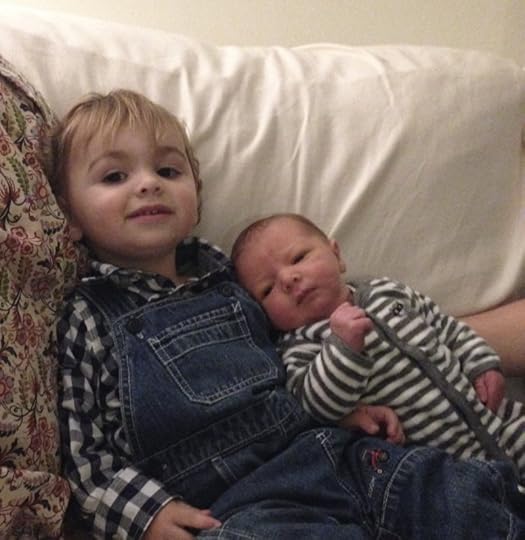What Advent is really about.
I promised you a little series on “getting ready to get ready,” aka “thinking about Advent” — and I know you will forgive me for not having the usual random and disconnected photos to go along with this post, as I am not at home.
Maybe you will survive with a low-image-quality-high-cuteness-content baby photo.
Do you know what is the most important event in the history of the world?
The Incarnation of Christ. The moment in time when God became man; commonly called Christmas.
This is what I want to tell you about Advent today, so you can have it in the back of your mind as it slowly dawns on you that Thanksgiving is next week… and then Advent starts three days later.
You could panic. That is what I usually do, and my panic is never actually helped by being told that there are one million activities I could be queuing up. Back in the day of raising my kids, the more activities I heard about (and here let me breathe a sigh of relief that the Internet, much less Pinterest, had not been invented), the more inclined I was to curl up in a little ball of paralysis, thinking only about how much I’d like to read a novel. I’m actually quite able to do a craft or nourish a tradition, but the sense of an impending deadline coupled with the burden of coming up wtih activities generally made and makes me less disposed to do anything more than what I already must, and not even those things.
(Also by the way, school — home or otherwise — still has to happen during these weeks, and I personally am not able to figure out how to add much to school, chores, meals, and reasonable bedtimes as well as do my Christmas shopping/crafting.)
(Also, as I have told you before, three of my children have birthdays in December, related to the fact that they were born in that month. I simply mention that to emphasize the hardship of giving birth in this inconvenient month and then having to celebrate birthdays in this same month pretty much forever.)
Maybe this syndrome is temperamental and I am way less capable than most women. Entirely likely. But maybe it’s also an intuition that something as important as the celebration of even a high holy day ought not to require a continual pep rally, so to speak.
In other words, are we tempted to base how we experience this time on how we feel, specifically on how frantic and/or ecstatic we feel? (Worse, do we try to get our loved ones to feel a certain way? I will address that later.)
I’ve noticed that Catholics and many other Christians have begun to remember the liturgical, as opposed to commercial, celebration of the seasons — much more than when I was searching for how to live my faith. That is awesome.
Yet the general tendency, greatly aggravated by our modern mindset and its hold over us, to emphasize how we feel threatens to derail what could be a good trend. Even if we don’t think of ourselves as particularly modern, we retain modernism’s imprint, thinking that our reaction to things, measured by our emotions, is the only sign we can trust.
Are we spending a lot of time and energy (and, actually, money*) watching ourselves feel something about Advent? Are we busily monitoring how we are doing with our religious efforts? Are we taking note of whether we are taking note? Very importantly, are we experiencing defeat when we don’t have what we consider the right feelings — the ones that the (well intentioned) people want us to feel?
Yikes. How to escape from this dangerous state?
Perhaps you could apply my parenting maxim (one of two**) to yourself: Don’t Seek Affirmation. In the case of our children, we should be affectionate, firm, and act for their good, without expecting them to register any particular emotion at the time.
What if we apply this thinking to ourselves? Instead of expecting affirmation from our feelings, we might try just worshiping God as He wants to be worshiped.
The whole of salvation history could be summed up, from our point of view, as trying to figure out in our fallenness how to accomplish the worship of God. What the Church offers is… well, the answer to how to bring our desire, deep in our heart, to offer worship God in line with the gift that God has given us in the Church.
The answer begins for us at Christmas.
The event of Christmas — the Incarnation — isn’t just a nice holy day — it is the turning point of every single hope of the human heart. The hugeness of all this challenges us (in the words of Romano Guardini), to renounce our own ideas and our own way, and “follow the lead of the liturgy.”
And that is what Advent calls us to do, and has to be for us, now (now is the acceptable time!): to orient ourselves to this momentous reality.
All I’m trying to say in this little post is that the Church has provided us with all we need and we don’t have to manufacture any feelings about it. Follow her lead in worship. That is, follow her in the celebration of the mysteries, the readings appointed for each day and each hour, and the prayers that gently and peacefully direct our gaze where it needs to be. Be attentive: Wisdom!
Bring this objectivity into the home with simple, liturgy-related traditions (and yes, a few little crafts, perhaps, and I will touch on those later) that appeal to you and your husband. Keep things old-fashioned so that, paradoxically, they remain timeless and universal. Make your devotions few and meaningful to your time and place. (E.g. if you are Swedish, then go for the daring St. Lucy crown of lit candles on a toddling girl’s head this December 13, but if you are not, don’t worry about it too much.)
Even traditions can devolve into distracting activities if they are not carefully connected to the life of the Church. Activity becomes busyness, busyness eclipses worship, and Church becomes not an altar of worship but a center for the administration of programs. Instead of turning to the liturgy as it uniquely guides us in its serene dispensation, every problem that we perceive calls forth its own special remedial program! We are in a sorry state of literally having programs to organize our programs, but very little in the way of actual worship.
However, we are made to worship…
This Advent, let’s learn to trust the Church to lead us to the star over Bethlehem.
We’ll talk about it some more, don’t worry.
_____________________________________
*We probably will need to buy some things.
Get candles here for your wreath. Get a sweet calendar here.
 Maybe download Universalis to get familiar with the Liturgy of the Hours. (A one-time charge gets you full access.)
Maybe download Universalis to get familiar with the Liturgy of the Hours. (A one-time charge gets you full access.)All the propers and readings for Sunday Masses can be found here. (I’m sure these can be found elsewhere as well, including on the Universalis site. You want to be sure that you are finding the Propers as well as the readings, because they reveal the mind of the Church for the day/week/season, and this way you will pattern your spiritual life on hers.)
The Little Oratory: A Beginner’s Guide to Praying in the Home
 — the book that will help you live the Liturgical Year in your home, with simplicity and beauty. Advent is the perfect time to start!
— the book that will help you live the Liturgical Year in your home, with simplicity and beauty. Advent is the perfect time to start!** Don’t Seek Affirmation is the first of my maxims. Part of doing right is that you don’t always get to see immediate results. The second maxim is Act, Don’t React. It’s related and I wrote about it here.
The post What Advent is really about. appeared first on Like Mother Like Daughter.




